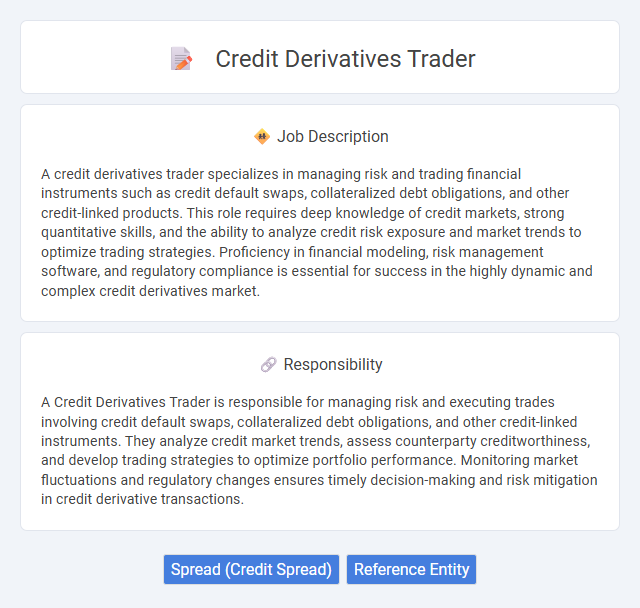
A credit derivatives trader specializes in managing risk and trading financial instruments such as credit default swaps, collateralized debt obligations, and other credit-linked products. This role requires deep knowledge of credit markets, strong quantitative skills, and the ability to analyze credit risk exposure and market trends to optimize trading strategies. Proficiency in financial modeling, risk management software, and regulatory compliance is essential for success in the highly dynamic and complex credit derivatives market.
Individuals with strong analytical skills and a high tolerance for risk may likely find a credit derivatives trader role suitable, given the job's demand for quick decision-making under pressure. Candidates who thrive in fast-paced, competitive environments and have a deep understanding of financial markets will probably perform better in this position. Those uncomfortable with volatility or requiring a predictable routine might find the role less aligned with their strengths.
Qualification
A credit derivatives trader must possess a strong foundation in quantitative finance, economics, and risk management, typically holding a degree in finance, mathematics, or a related field. Proficiency in financial modeling, pricing complex credit instruments, and understanding market dynamics is essential, alongside experience with trading platforms and regulatory compliance. Advanced skills in programming languages like Python or VBA and certifications such as CFA or FRM enhance a candidate's qualifications and job performance.
Responsibility
A Credit Derivatives Trader is responsible for managing risk and executing trades involving credit default swaps, collateralized debt obligations, and other credit-linked instruments. They analyze credit market trends, assess counterparty creditworthiness, and develop trading strategies to optimize portfolio performance. Monitoring market fluctuations and regulatory changes ensures timely decision-making and risk mitigation in credit derivative transactions.
Benefit
Credit derivatives traders likely benefit from lucrative compensation packages reflecting their high-risk, high-reward role in financial markets. Exposure to complex financial products may enhance their analytical skills and market insights, potentially increasing career growth opportunities. The dynamic trading environment probably fosters quick decision-making and adaptability, valuable traits in finance.
Challenge
A credit derivatives trader likely faces the challenge of managing complex risk exposure in volatile markets, requiring sharp analytical skills to evaluate creditworthiness and default probabilities accurately. The role may demand quick decision-making under uncertainty to capitalize on arbitrage opportunities while minimizing potential losses. Navigating regulatory changes and market disruptions could further increase the difficulty of maintaining profitable trading strategies.
Career Advancement
A Credit Derivatives Trader specializes in managing risk and trading financial instruments linked to credit events, offering substantial earning potential and skill development in financial analytics, risk management, and market strategy. Career advancement typically progresses from junior trader roles to senior trader and portfolio manager positions, with opportunities to lead trading teams or move into executive risk management or investment strategy roles. Mastery of quantitative analysis, regulatory knowledge, and strong decision-making skills significantly enhances promotion prospects within top investment banks and hedge funds.
Key Terms
Spread (Credit Spread)
A credit derivatives trader specializes in managing and trading instruments tied to credit risk, with a primary focus on credit spreads, which represent the difference in yield between corporate bonds and risk-free government securities. Understanding and accurately predicting credit spreads is crucial for pricing credit default swaps (CDS) and other derivative products, enabling traders to hedge against or speculate on the creditworthiness of issuers. Expertise in market trends, credit ratings, and macroeconomic indicators allows credit derivatives traders to optimize portfolio performance and manage exposure to credit events effectively.
Reference Entity
A Credit Derivatives Trader specializes in managing risks linked to credit events of Reference Entities, which are typically corporations or sovereign issuers. This role requires in-depth analysis of the creditworthiness and default probabilities of the Reference Entity to price credit default swaps (CDS) and collateralized debt obligations (CDOs) accurately. Understanding market sentiment and regulatory impacts on the specific Reference Entity is crucial for effective risk management and profitable trading strategies.
 kuljobs.com
kuljobs.com